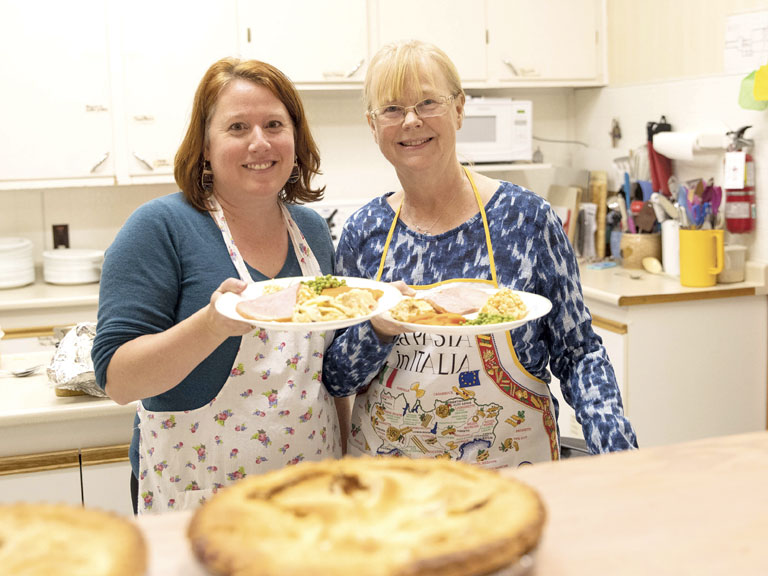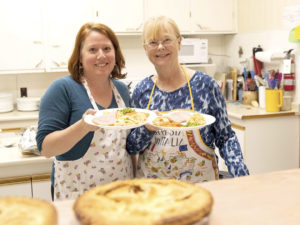County News
County Food Collective

Coordinated program to address food insecurity being developed
Only about one-quarter of the residents of Prince Edward County who are in a precarious position regarding food access and availability will make use of the services provided in the community. This proportion is not unique to the County, but is consistent all across Canada, except for those areas that have what is known as a community food centre. In those areas, the use of food services is much higher, both by the general community and by those who are food insecure. Working with a $15,000 grant from the Rural Ontario Institute, a group of local organizations including the Picton and Wellington foodbanks, The County Foundation, Hastings Prince Edward Public Health and Food to Share formed the County Food Collective and recently completed a project to lay out the guidelines of what a community food centre in the County would look like. They interviewed people who were food insecure to get their ideas on how to make the services more accessible, and they examined what is currently being done to meet the needs. From this work, a vision of a new way to provide food services emerged. “A community food centre would be an inviting place, having space to cook meals and being able to serve meals there,” said Glen Wallis, founder of Food to Share and a member of the Collective. “It’s more like a community project around food, as opposed to a food project that tries to include the community.”
One of the difficulties noted by the Collective is that the Picton and Wellington foodbanks are operated from church basements, and are not easily accessible by people with mobility issues. Another is that proof of income is required for users of the foodbank, which makes some potential clients feel as if they are asking for a charity handout.
“A food centre is a community project where all people are encouraged to come, and there is no means testing as in a foodbank,” said Wallis. “There are a lot of important distinctions between a foodbank and a community food centre.” The Collective envisions a central location as being the hub of a community food centre. There would be space for cooking, space to have a community meal, as well as offering things such as cooking classes. In order to provide service across the County, one idea under consideration is to use the local town halls as distribution points, as well as locations for community meals that have been prepared at the food centre, with some additional food preparation done on site.

(L-R): Volunteers Karen Palmer and Marg Lake serve up some tasty food at the Wellington Community Dinner in the St. Andrew’s Anglican Church Hall.
The Collective’s proposed model builds on things that are already being done in the County. Community meals, for example, are offered at no charge in Demorestville, Wellington and Picton. In Wellington the community meal takes place on the third Wednesday each month, aside from July and August. It was started as a way to help those affected by the loss of employment after a fire destroyed the Midtown Meats plant, and it has continued since. “Our community recognizes there is a need, on an on-going basis,” said co-organizer Kim Taylor. “There is a real mix of people, some who need the help and some who just want to come out and be part of the community. There is a very social aspect to it.” Each month a different local business or organization prepares the meal, which is served out by a team of volunteers. Diners have the option of making a freewill donation, and any extra funds, after expenses, are donated to local food causes.
Prepared meals are also provided by Food to Share. Volunteers cook meals at three community kitchens in the County, and those meals are distributed to the foodbanks, as well as to the ROC youth centre. In 2019, volunteers cooked up over 5,800 meals during 102 cooking sessions. The partnership with the ROC also extends to offering cooking classes for youth. Each month a group of up to eight students prepare a full meal at the kitchen in the Picton Community Centre, under the guidance of Food to Share volunteers. Typically they will make about 60 dinners, which are then taken to the ROC and distributed to a number of families. Teaching young people how to cook can have lasting benefits. “It’s more affordable to go out and buy groceries and then prepare a meal, than to buy prepared foods,” said Ben Wadsworth of the ROC. “And the parents are so happy when their child can cook a meal at home.” Darlene Thompson said that the ROC provides lunches and snacks for all the youth who use the centre, and she is pleased with the cooking program. “We’re so grateful to the volunteers at Food to Share. They are amazing cooks and great mentors to the young people, and they are really passionate about this program.”
There is widespread support at the community level to address food insecurity, from volunteers cooking meals, to farmers donating vegetables at harvest time, to gardeners such as Neil Sipkes bringing fresh produce in season to the foodbanks. “I’ve always enjoyed growing vegetables, and anytime I have an excess of anything I make a point of taking it to the foodbanks,” he said. “One of the things that triggered me taking vegetables to the foodbank was that you can’t get some nutrients from packaged foods. There is an abundance of fresh food in the County, but people can’t always afford it, or have the ability to go and find it. One of the things that made it worthwhile for me was one day when I walked in to the foodbank with a basket of freshly picked corn and a woman waiting there said, ‘Is that fresh corn? Can I have some?’ the moment she saw me, and that kind of made my day.”
The Food Collective is currently applying for a grant to set up a community food centre. The Community Food Centres of Canada is looking for an intake of five such centres and is offering a grant of $75,000 per year for three years to successful applicants. “The County may be a little small to get a grant, but we’re hoping the enthusiasm and buy-in from the municipality and foodbanks helps,” said Wallis. “Dealing with food insecurity in the County requires a very different approach compared to a large city. I haven’t found another municipality in Canada that does as much as we do without a paid staff.” Even if the grant application is not successful, Wallis said that with fundraising and a determination to succeed, a community food centre will be built in the County.

Hello,
These programs look so interesting and helpful for so many. It is now January 2024 and this article is from 2020, but I am interested in speaking with someone to offer our help.
We have a vegetable garden and usually have lots of extra to share. As well, I enjoy cooking and would enjoy helping in one of the kitchens.
We look forward to hearing from you.